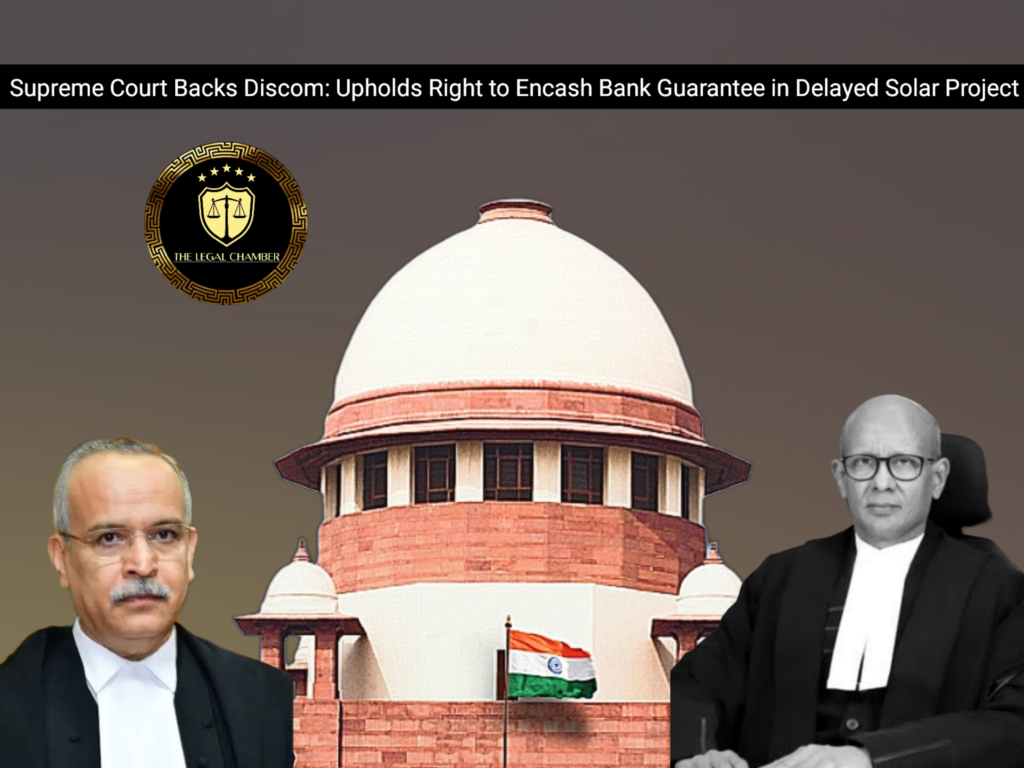
The Supreme Court held that the Power Purchase Agreement’s explicit terms govern the parties’ rights. The encashment of the performance bank guarantee was valid as the developer failed to seek an extension under the contractual mechanism or issue a mandatory Force Majeure notice. Regulatory commissions cannot rewrite the contractual risk allocation or grant remedies outside the agreed framework.
Facts Of The Case:
The dispute arose from a Power Purchase Agreement (PPA) executed between Chamundeshwari Electricity Supply Company Ltd. (CESC) and Saisudhir Energy Pvt. Ltd. for a 10 MW solar power project. The PPA stipulated that the developer was to achieve the Commercial Operation Date (COD) within 12 months, preceded by fulfilling certain Conditions Precedent within 240 days. A critical precondition was the readiness of the 220 kV evacuation transmission lines, which were to be built by Karnataka Power Transmission Corporation Ltd. (KPTCL), a state utility. These lines experienced significant delays, making it technically impossible for the developer to synchronize and supply power by the scheduled COD. Consequently, CESC encashed the developer’s performance bank guarantee. The developer petitioned the Karnataka Electricity Regulatory Commission, which held the transmission delay constituted a Force Majeure event, ordered the guarantee’s restoration, and mandated a tariff renegotiation. This decision was upheld by the Appellate Tribunal for Electricity. The Supreme Court’s appeal centered on whether this encashment was contractually valid and if the regulatory bodies could grant such relief that altered the PPA’s explicit risk allocation.
Procedural History:
The procedural history of this case commenced when Saisudhir Energy filed a petition (O.P. No. 24 of 2014) before the Karnataka Electricity Regulatory Commission (KERC) seeking relief from the encashment of its performance bank guarantee and an extension of project timelines. The KERC, in its final order dated 28.01.2015, ruled in favour of the developer, directing the restoration of the bank guarantee, extension of timelines, and tariff renegotiation. Aggrieved by this order, CESC filed Appeal No. 176 of 2015 before the Appellate Tribunal for Electricity (APTEL). The APTEL, vide its judgment dated 21.03.2018, dismissed the appeal and affirmed the KERC’s order in its entirety. This led CESC to file the present Civil Appeal No. 6888 of 2018 before the Supreme Court of India, which, in its judgment dated August 25, 2025, allowed the appeal and set aside the concurrent orders of both the APTEL and the KERC.
READ ALSO : Supreme Court Says Long-Term Cohabitation Can Prove Valid Marriage for Inheritance Claims: Landmark Ruling
Court Observation:
The Supreme Court observed that the Power Purchase Agreement (PPA) was a comprehensive commercial contract allocating specific risks and remedies. It held that the developer’s failure to achieve the Commercial Operation Date was a clear default, as it had neither formally sought an extension under Article 5.7 of the PPA for delays attributable to the utility nor issued the mandatory Force Majeure notice under Article 14.5 as a strict condition precedent. Consequently, the appellant’s invocation of the performance bank guarantee under Article 4.4 was a valid exercise of a contractual right. The Court further held that regulatory bodies, like the State Commission and the APTEL, cannot rewrite the contractual framework or grant remedies alien to the agreement under the guise of equity, as their jurisdiction is limited to adjudicating disputes within the PPA’s four corners.
Final Decision & Judgement:
The Supreme Court allowed the appeal and set aside the impugned judgments of the Appellate Tribunal for Electricity and the Karnataka Electricity Regulatory Commission. The Court held that the encashment of the performance bank guarantee by Chamundeshwari Electricity Supply Company Ltd. was legally valid and in strict conformity with the Power Purchase Agreement. This was because the developer, Saisudhir Energy, had failed to fulfil its contractual obligations within the stipulated time and had not availed itself of the specific contractual remedies for extension or Force Majeure relief. The regulatory fora were found to have exceeded their jurisdiction by directing the restoration of the bank guarantee, extending timelines, and mandating tariff renegotiation, thereby wrongly altering the explicit risk allocation agreed upon by the parties in the commercially settled contract.